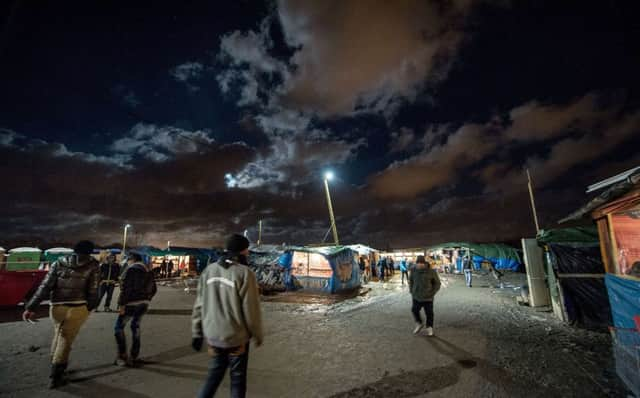Scot tells of ‘horrific’ conditions for Calais refugees


Sarah Story, 25, from Edinburgh, said the mood in the camp had become noticeably less optimistic as the cold and rain forced residents to stay inside their tiny shelters and the political situation across Europe dampened hope that their situation would improve.
She said the sanitation infrastructure is struggling to cope with the camp’s 6,000 inhabitants, while some refugees desperate to protect their families have turned to crime to obtain food and gas.
Advertisement
Hide AdAdvertisement
Hide AdTwo fires have broken out in refugees’ homes in recent weeks, sparking claims that the French authorities have refused to send emergency vehicles into the camp.
Story, who arrived at the camp in October, abandoned her plans to travel around the world in favour of volunteering at the camp, dubbed “the Jungle” by residents – most of whom are fleeing atrocities in their homelands of Afghanistan, Eritrea, Iraq and Syria – and plans to stay at least until March.
The camp was set up as a stop gap for refugees aiming to travel to Britain, but the structures have become more permanent after authorities cracked down on those trying to travel across the Channel.
“I was going to go travelling but I realised that this was happening on our doorstep and I thought it made more sense to come here,” said Story, who is studying for a postgraduate degree in law by distance learning at Aberdeen’s Robert Gordon University. “I had worked with refugees before and hoped I could do some good.
“The conditions are horrific and disgusting and people are very much suffering. It is like a slum in a third-world country, but even worse as it is freezing and wet.
“People here are desperate, they just want to be able to feed their families.”
An international relations and anthropology graduate from the University of St Andrews, Story is working with Jungle Books – a school, library and arts hub for refugees living in the camp. She is also a point of contact for Edinburgh-based charity Re-Act, which has sent aid convoys to refugees across Europe.
“Since I arrived here in October, things have changed,” she said. “We were lucky in October: we were having a late summer and there was a feeling of hope in the camp that things were happening in Germany and there was hope of a future. As winter has hit, conditions have been made worse.”
Advertisement
Hide AdAdvertisement
Hide AdRefugees have to queue for hours to access washing facilities, while they are only guaranteed one meal a day.
“There are a few showers set up by the state that people can use, but they have to queue at least two hours for an eight-minute shower,” she said. “There are also cubicles which give people privacy while they essentially tip a bucket of cold water over their heads, but that is set up to cope with 600 refugees, while there are 6,000 now. There is no way people can wash every day.”
Refugees at the camp are housed in canvas shelters which residents have lined with duvets in a bid to keep out the cold.
“They are a step up from tents, but not by much,” said Story, who shares a flat with other volunteers in a nearby town. “I feel lucky that I do not have to live on the camp, in these conditions, but no-one should have to live like this.”
A large fire broke out in the camp on 13 November, the same night as the terror attacks in Paris.
The blaze, which destroyed 2,500 metres of tents and shelters, is believed to have started accidentally, fuelled by exploding gas canisters used by residents to cook.
A second fire last weekend destroyed around ten shelters and injured two people. A pregnant woman was also treated by volunteer doctors for shock.
“Some people say ambulances will not come into the camp, but I don’t know,” said Story. “I have seen plenty of French police in the camp, but never a doctor or ambulance.”